15 Ways to Ruin Your Social Media Strategy
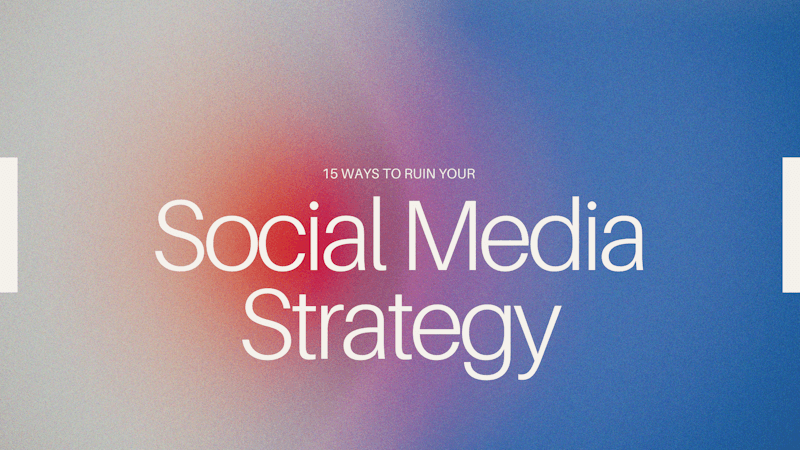
Simply having a presence on Twitter, Facebook, and Instagram doesn’t guarantee your company scores of fresh leads and new customers. In fact, recent studies by Manta have found that 60% of small businesses have yet to see a significant ROI from their social media strategy.
According to Social Media Guru Ted Rubin, the problem has everything to do with faulty company strategies. You can’t just set up profiles and expect fresh leads to come streaming in. You’ve got to invest your energy wisely, and build a social media strategy that’s bulletproof.
If you’re not sure whether your efforts are setting your business up for a win or fail, we’ve curated insights on the most common mistakes, and how you can fix them.
1. You’re Not Using Analytics
How quickly is your Twitter network growing? What percentage of your website traffic comes from social media channels? If you don’t know the answers to these questions, you could be guilty of avoiding analytics, one of the most deadly social media strategy sins.
Failing to track metrics means you’re operating off gut feelings, not data. In best case scenarios, your social media strategy could stagnate. In the worst, you could be pouring precious resources and time down the drain by engaging in tactics that aren’t driving results.
Practical Fix: You don’t need to convert into an analyst overnight, but you should pick a handful of metrics to track and analyze on a regular basis. Depending on your goals and the platforms you’re using, they could include the following:
- Growth in Followers
- Engagement: ReTweets, Shares, Comments, Likes, and +1s
- Website Traffic from Social Referrals
Calculating engagement and follower growth by hand can be laborious, which is why we recommend a social analytics tool for metrics newbies. Sprout Social is user-friendly, affordable, and offers visually-appealing custom reports.
2. You’re Not Responding
The purpose of Facebook, Twitter and other platforms is to be social, after all. If your social media strategy doesn’t include dedicated time for engagement, you could be missing out on critical opportunities to nurture leads, connect with prospects, and perform customer service.
Studies have found that 42% of social media users expect a response to customer service queries from companies in no more than one hour.
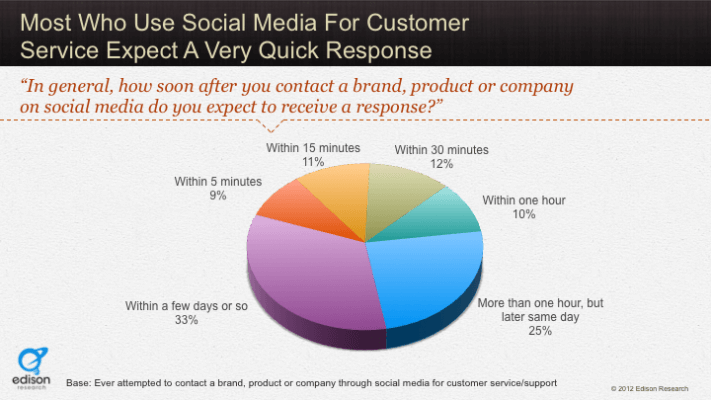
Ignoring questions and complaints won’t make the issue go away. Slow response times can damage perception of your company, and result in frustrated customers.
Practical Fix: It’s an unfortunate fact that Facebook never takes a day off. Your brand’s social media strategy should include a specific plan for monitoring comments, Tweets, and posts during the evening and weekend hours, as well as contingencies for when your dedicated social staff goes on vacation. If your customer base is international, it could pay to arrange monitoring resources around-the-clock.
3. You’re not Using the Right Platforms
Does your ideal customer spend their free time on Instagram? Are they an early adopter dedicated to Facebook, or a busy professional who uses LinkedIn as a news source? All too often, organizations will pour their time and resources into Facebook and Twitter since they have the most members, without really considering whether it’s the right platform for their business. Failing to dedicate your social media strategy to the platforms which align best with your prospects’ interest can cripple your best laid plans for lead generation and content promotion.
Practical Fix: Perform research on your current customers’ social media habits, and ensure your company’s buyer persona profiles include insight on internet usage and research tendencies. The graphic below from Pew Research includes brief insight into the typical demographics of major social platforms:
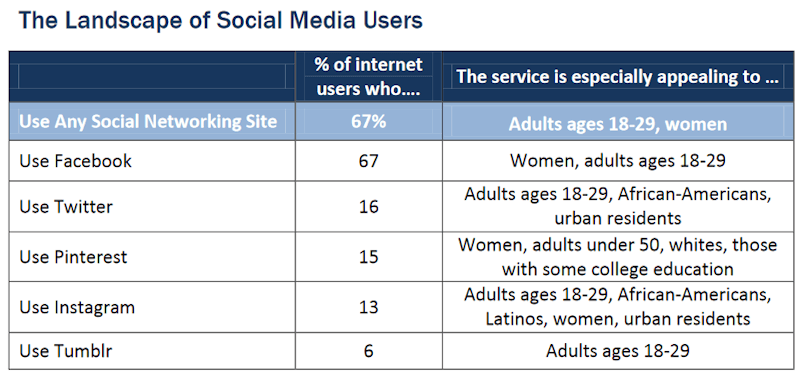
Image credit: Pew Research Center
For more insight on developing customer profiles, check out Building an Epic Buyer Persona Profile: a Totally Comprehensive Guide.
4. You’re Not Investing Enough Time
Do you know how much time you should be investing in a single social media platform each month? About 32, according to the experts at Forbes. That’s a lot of man hours. Too many small businesses overstretch their resources, and try to immediately begin dominating Twitter (X), Pinterest, Instagram, Facebook and LinkedIn, when they simply don’t have the time for all five major platforms.
As social media expert Kim Garst points out, many inbound marketers fail at social media strategy because they bite off more than they can chew. Garst writes wisely that “it is better to manage one social media site REALLY well than stink at four.” Not putting enough time into your strategy could mean your company’s posts aren’t getting seen by prospects, or that you’re missing out on crucial opportunities to respond to questions and comments in a timely manner.
Practical Fix: If you don’t have the resources to add a dedicated social media manager, identify the channels which are yielding the best results for your business, and double-down on dominating those networks. Even if you can’t dedicate 32 hours a month to each platform investing as much time as possible can improve results significantly – Manta Research found the average small business owner spends less than 3 hours online each month.
5. You’re Not Using Visual Content
Relying solely on text and link-based posts can seem like a simple way to cut back on the time associated with managing social media. However, this tactic is tantamount to social media strategy suicide. Instagram, Pinterest, Facebook and LinkedIn are all visually-dominated platforms, and failing to provide images, videos, and infographics can cause your posts to be overlooked entirely. HubSpot’s Dan Zarrella has found that visual content on Facebook can lead to a 65% increase in engagement for brands.
Practical Fix: Take the time to upload images separately with your content links to increase the amount of real estate your posts take up in busy Facebook and Instagram feeds. To add an extra element of interest to your images in mere minutes, use the text overlay app YouCam Perfect.
To dig deeper into practical tips and ideas for visual content for your social media strategy, dive into Visual Content Marketing Insights from 13 Genius Thought Leaders.
6. You’re Not Curating Content
Using your social media channels exclusively or primarily to promote your content marketing can make your company seem self-centered and pushy. Additionally, failing to share the work of others can damage your chances of making important connections with other bloggers.
Practical Fix: Curating high-quality content from a variety of sources to provide your followers with the most value possible will significantly improve perceptions of your company online. Marketing expert Chris Brogan recommends a 12:1 ratio of curated content to original work. Use hashtag searches on Twitter, and keyword searches on Pinterest to connect with valuable content to curate and publish on your social channels.
7. You’re Not Failing Quickly
If your social media posts are scheduled weeks into the future, you receive definite points for planning, but could struggle to pivot your strategy if necessary. The concept of “failing quickly” has been gaining steam among inbound marketers. Often credited as a concept to Yahoo’s CEO Marissa Mayers, it’s the idea of being sufficiently flexible to make changes on a dime.
You can’t have a successful social media strategy without being ready to fail quickly. Real-time publishing requires sensitivity to current events and a willingness to pivot on a moment’s notice.
Practical Fix: You can and should schedule your posts ahead, but never let your social media strategy run on auto-pilot. Check your metrics often, and be prepared to shut off or modify your publishing on an as-needed basis.
8. You Don’t Have Goals
What is your company hoping to accomplish with a social media strategy? How quickly are you trying to grow your networks, and what are your sales goals for the next quarter? If you’re not able to articulate where you’re going, there’s a 100% chance your social media strategy will never reach its potential.
Practical Fix: Set SMART goals for your outreach, which are specific, measurable, attainable, realistic and timely. Cohen recommends making your targets as granular as possible: “‘generate 10 new leads in three months’ is better than ‘improve sales.’“
9. You’re Not Posting at the Right Times
It’s easy to get caught up in other marketing duties, and fire off Facebook posts when convenient. Failing to publish at the right times can cause your posts to be overlooked, causing your brand to miss out on critical engagement opportunities.
Practical Fix: Optimal publishing times can vary drastically according to platform and industry. The graphic below illustrates that cross-industries, morning, evening and mid-afternoon posts tend to gather the most engagement on Facebook and Twitter:
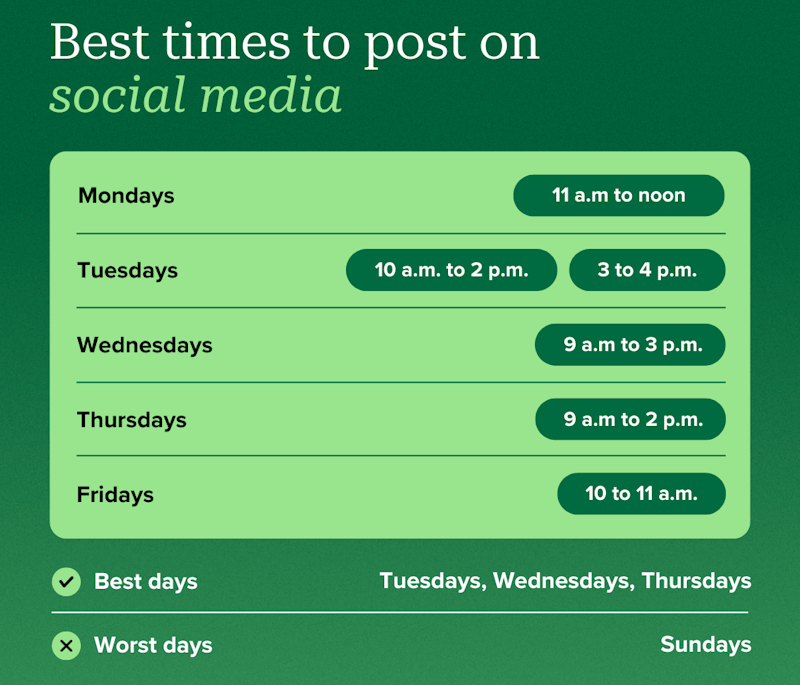
Image credit: Sprout Social
Monitor engagement and test continually to find what works best for your organization.
11. You’re Not Integrating With Your Marketing
Does your social media strategy include collaboration with your content marketing team, sales, and product development? Failing to communicate within your organization can cause your company to miss the boat on content promotion, sales-related communications, and important branding efforts. While creating a comprehensive inbound marketing strategy is no small feat, effective communication between marketers can help your company develop a more cohesive online voice.
Practical Fix: Utilizing Google docs or project management software, create a culture of total transparency between marketing staff, to better promote blogs, eBooks, sales initiatives, and specials. Additionally, investing the time in a content style guide can allow your social media strategy to reflect your company’s branding better. For more insight, we recommend 14 Tools for Writing a Content Marketing Style Guide for Your Blog. You’re Not Relevant
Social media is a real-time publishing tool. You’re certainly not doing your company’s followers or image any favors if you’re publishing ancient memes, or weeks-old news links. Too often, companies fail to invest in ongoing education and exposure to trending content and topics, and settle for publishing mediocre content that’s just not timely or relevant, causing engagement rates to plummet.
Practical Fix: Every social media manager’s best friend should be news alerts, which immediately notify you of both major news events and industry happenings, so you can respond appropriately with tailored posts. In the event of major tragedies, be sure to shut off any scheduled posts or respond in an appropriately sensitive manner.
12. You’re Not Posting Enough
If there were a single way to ensure failure on social media, it would be skipping out on posting daily. However, according to research by Constant Contact, only one out of four small businesses publishes to Facebook daily:
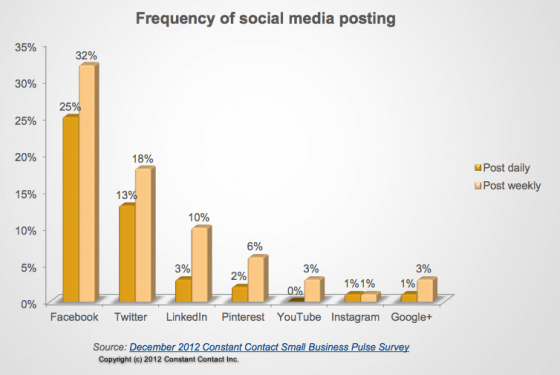
Failing to post enough to social media channels can cause your brand to slip to the back of your prospect’s mind, causing your company to miss out on sales, or lose leads to your competitors.
Practical Fix: Publish to your Facebook page at least twice daily, and try to Tweet at least four times around the clock, in order to maximize your company’s chances for exposure. If you’re struggling to come up with enough content to publish, invest heavily in a content curation strategy.
13. You’re Not SEO-Optimizing
Too often, social media managers have no clue the keywords their content marketing team is optimizing around, and fail to take advantage of social’s latent SEO potential. Major search engines crawl and index every social media post published daily, and social posts are displayed on search engine results pages (SERPs) alongside website pages. Recent changes in the algorithms of major search engines have blurred the lines between social media strategy and SEO as distinct practices, meaning failing to search-optimize your posts can cause you to lose out on some major potential.
Practical Fix: Create a shared content calendar with your content marketing team or on-staff SEO wizard which includes keywords your company is trying to optimize around. Include these terms in your social media posts, and social tags where appropriate. Cohen additionally recommends including text posts to support your visual content and pack an extra SEO punch.
14. You’re Not Taking Advantage of Tools
Social media requires a lot of hard work to curate content, create engaging posts, and respond to comments in a timely manner. Too often, companies fail at engagement, publishing frequency or other critical areas because they’re working harder, not smarter. There’s a remarkable asset known as social media tools for everything from scheduling to search-optimization, and the best social media strategy should include at least one or more of these.
Practical Fix: While the optimal tools for your brand can vary drastically according to the scale of your social media strategy, goals, and budget, you should at a minimum adopt a platform like HootSuite for scheduling and social listening. For more insights, we recommend Nicola Gwillym’s article 27 Social Media Tools Every Content Creator Needs.
15. You’re Not Listening
Social media isn’t a megaphone, it’s a platform for two-way conversations between brands and their prospects and customers. If you’ve got to cut corners somewhere on your social media strategy, don’t drop out on social listening, cut back on the amount of platforms you’re using. Rubin is a firm believer that monitoring networks for conversations about industry keywords, or consumers who are dissatisfied with yours competitors is where the magic (and ROI) really happens.
Practical Fix: Set up keyword streams in a tool like TweetDeck to monitor relevant conversations for consumers looking for answers, or venting their frustrations about your competition. Strive to be helpful and provide relevant resources, and dedicate significant time to connecting with these consumers.
What are some of the most common reasons you see small business social media strategy failure? What are your favorite tips for overcoming common challenges?

Comments (0)